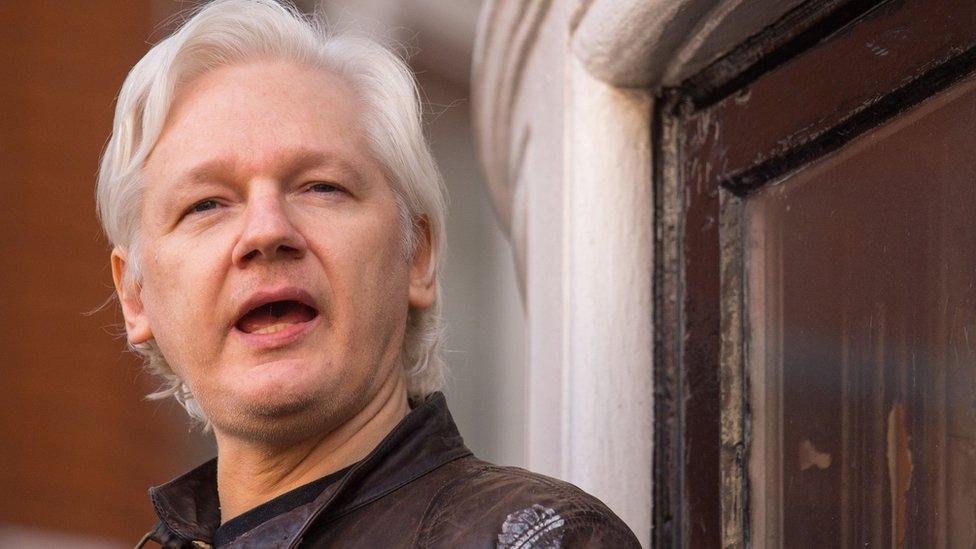Julian Assange: Warrant for his arrest upheld by court
- Published

An arrest warrant for the Wikileaks founder Julian Assange has been upheld by Westminster Magistrates' Court.
The warrant was issued in 2012 when Mr Assange, 46, breached bail conditions by seeking political refuge at the Ecuadorean embassy.
On Tuesday, the judge said he needed to face justice for breaching bail and therefore the warrant should remain.
Mr Assange, who has been staying at the embassy since 2012, tweeted his "surprise", external at the decision.
His bail was set in relation to sexual assault allegations he faced in Sweden. The allegations were dropped in May 2017.
Under the warrant, Mr Assange would be arrested as soon as he left Ecuadorean soil.
As there is not an extradition treaty between the UK and Ecuador, he cannot be arrested inside the embassy.
To explain his decision to break his bail conditions, Mr Assange argued that should he face the Swedish authorities, they would extradite him to the US.
He fears he would be charged by US authorities for publishing classified documents on his Wikileaks website.
But Judge Emma Arbuthnot said she did not find this fear "reasonable" - as any decision by Sweden to extradite Mr Assange to the US would cause a diplomatic crisis.
Even if that decision was taken, she argued, Mr Assange would be able to argue against extradition by citing extraneous circumstances, fair trial concerns and poor conditions in US detention centres.
In her ruling,, external she described Mr Assange as "a man who wants to impose his own terms on the course of justice, whether the course of justice is in this jurisdiction or Sweden".
"He appears to consider himself above the normal rules of law and wants justice only if it goes in his favour."
Supporters outside court
Mr Assange's lawyers said his arrest for failing to answer bail was no longer in the public interest but the judge rejected that argument.
"Defendants on bail up and down the country, and requested persons facing extradition, come to court to face the consequences of their own choices," she said.
"He should have the courage to do the same."
After the ruling, Mr Assange posted his reaction on Twitter, saying: "We are surprised.
"Judge went well outside what the parties presented in court. This seems to have led to many factual errors in the judgment."
A small group of supporters stood quietly outside the court, holding banners reading "Free Assange" and "Assange Safe Passage".
Mr Assange's lawyer, Mark Summers, said his client was living in conditions "akin to imprisonment," adding that his "psychological health" had deteriorated and he was "in serious peril".
The court heard that Mr Assange suffers from a bad tooth, a frozen shoulder and depression.
The judge rejected these claims as reason to lift the warrant, saying: "Mr Assange's health problems could be much worse."
She also rejected a UN report, cited by Mr Assange in his appeal, that said he is subject to arbitrary detention.
She highlighted that he himself had negotiated the bail conditions he went on to break.
- Published11 January 2018
